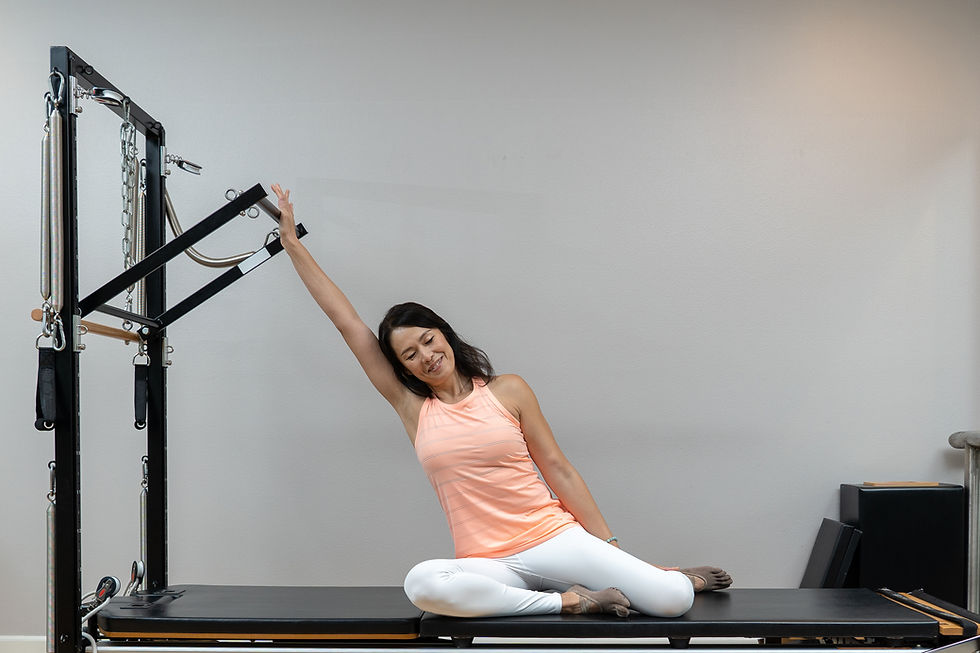Reformer Academy: What Makes a Great Pilates Instructor Course?
- Adicator Digital Marketing Agency

- Jul 23, 2025
- 3 min read
Have you ever left a Pilates class feeling invigorated, centered, and deeply connected to your body? Perhaps you've watched your instructor with admiration, thinking, "I'd love to share this feeling with others. I want to become a Pilates instructor." It’s an incredibly rewarding path, but choosing the right training program is crucial.
With so many options available today, especially in a dynamic fitness landscape like Munich and throughout Germany, how do you distinguish a truly exceptional Pilates instructor course from an adequate one? At Pilates Roecklplatz, we believe in the power of comprehensive, high-quality education. Our own passion for Pilates stems from deep understanding, and we want to help you find a program that fosters the same.
So, if you’re considering stepping into the rewarding world of Pilates instruction, here’s what makes a great Pilates instructor course truly stand out.

1. A Comprehensive, Anatomy-Rich Curriculum
The foundation of a great Pilates instructor is a deep understanding of the human body. Your course should offer:
Detailed Anatomy & Physiology: Not just memorization, but practical application. How do different muscles work in each exercise? What are common postural deviations, and how do they impact movement?
Biomechanics: Understanding the mechanics of movement is key to teaching safely and effectively. You should learn about joint function, lever systems, and how forces act on the body.
Full Repertoire Mastery: A great course will cover the entire classical and contemporary Pilates repertoire – not just a select few exercises. This includes Mat, Reformer, Cadillac, Chair, and Barrels, building progressions and regressions for diverse clients.
Modifications & Variations: Clients come with varied bodies, injuries, and fitness levels. A top-tier program teaches you how to modify exercises for different needs and how to challenge advanced practitioners.
2. Experienced, Supportive, and Accessible Mentors
Your instructors are your guides, your first role models, and your most valuable resource. Look for:
Deep Practical Experience: Do they have years of teaching experience across various client types? Can they demonstrate and explain with precision and clarity?
Strong Pedagogical Skills: It's one thing to know Pilates; it's another to teach it effectively. Are they skilled at explaining complex concepts, providing constructive feedback, and fostering a positive learning environment?
Accessibility & Mentorship: Do they offer opportunities for one-on-one guidance, feedback sessions, and ongoing mentorship even after formal modules? A truly great program offers a supportive community, not just a series of lectures.
3. Emphasis on Hands-On Practice and Observation
Theory is essential, but Pilates is a practice. A superior course will prioritize:
Extensive Practice Teaching: You need ample opportunities to teach peers, practice cueing, and refine your hands-on adjusting skills in a supervised environment. This builds confidence and competence.
Observation Hours: Watching experienced instructors teach actual classes (not just other trainees) provides invaluable insight into class flow, client management, and real-time problem-solving.
Personal Practice Requirements: To teach Pilates, you must do Pilates. A strong program will require a significant number of personal practice hours to deepen your own understanding and embodiment of the method.
4. A Strong Focus on Teaching Methodology & Cueing
Beyond knowing the exercises, you need to know how to teach them. This includes:
Effective Verbal Cueing: Learning precise, concise, and motivating language to guide clients.
Tactile Cueing & Spotting: How to safely and effectively use touch to guide movement and provide support.
Observation Skills: Developing a keen eye to assess bodies, identify imbalances, and spot compensations.
Lesson Planning & Progression: How to design engaging classes and long-term programs that meet individual client goals.
Client Assessment: Learning how to evaluate a client's posture, movement patterns, and goals to tailor their program.
5. Clear Pathway to Pilates Instructor Course & Continuing Education
Recognized Certification: Ensure the program leads to a certification that is well-respected and recognized within the Pilates industry, both nationally (e.g., in Germany) and internationally.
Post-Course Support: Does the academy offer resources for job placement, business development, or continuing education workshops? The learning should not stop at graduation.
Ethical Considerations: A good program will also touch upon the ethics of teaching, professional boundaries, and client confidentiality.
Investing in Your Future
Choosing a Pilates instructor course is a significant investment – in your time, your finances, and your passion. By carefully evaluating these key criteria, you’ll be well-equipped to select a program that not only teaches you the repertoire but also transforms you into a confident, competent, and inspiring Pilates professional.
At Pilates Roecklplatz, we are committed to the highest standards of Pilates education, whether through our dynamic classes or in fostering the next generation of instructors. We believe that a great instructor is a lifelong student, and it all starts with a foundational training that truly empowers you.







Comments